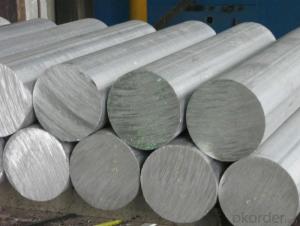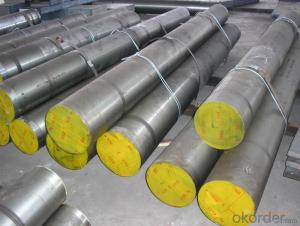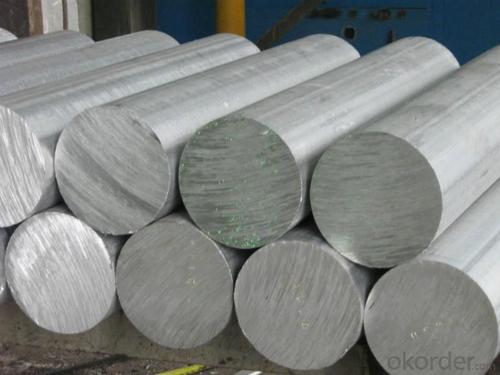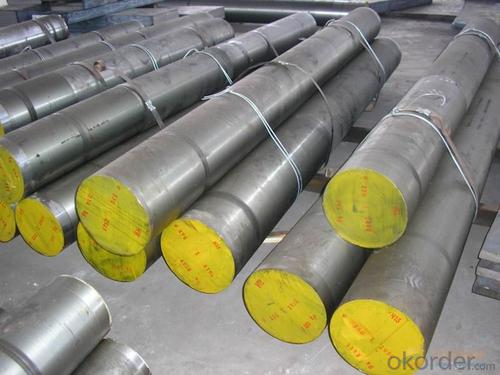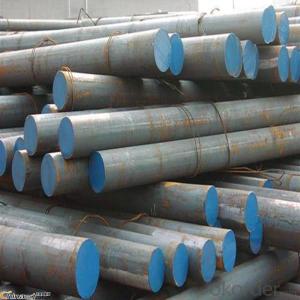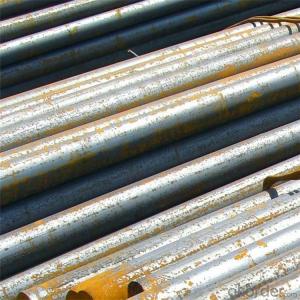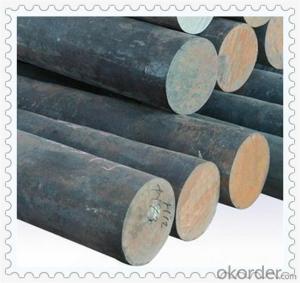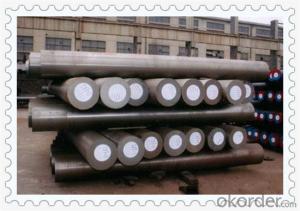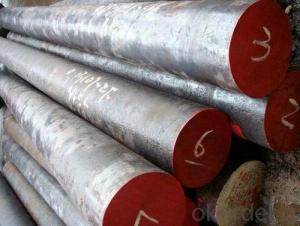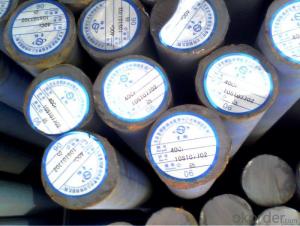SAE 4340 Alloy Steel Round Bar SCM430 Steel Bar
- Loading Port:
- Tianjin
- Payment Terms:
- TT OR LC
- Min Order Qty:
- 25 m.t.
- Supply Capability:
- 50000 m.t./month
OKorder Service Pledge
OKorder Financial Service
You Might Also Like
Specification
SAE 4340 Alloy Steel Round Bar SCM430 Steel Bar
Product Details:
1) Melting process: BOF + LF + VD
2) Heat treatment: Normalized / Annealed / Quenched / Tempered
3) Surface condition: Black surface / Peeled / Turned / Milled
4) Straightness: Max.3mm/1000mm
5) Appearance: Free of cracks, visible inclusions, pit on the appearance;
6) Guarantee: Ultrasonic test according to SEP 1921-84 G3 C/c
7) Certificate of quality: SGS
8) Marking: Grade, Heat No.,Diameter will be stamped one each bar with required color
9) Packing: In bulk packing
10) MOQ: 25 tons / Grade / Size
11) Delivery time: 30 days
12) Payment: T/T or 100% LC at sight.
Designation by Standards
rand Name | Ravne No. | Mat. No. | DIN | EN | AISI |
42CD4 | 514 | 1.7225 | 42CrMo4 | - | 4140 |
Chemical Composition (in weight %)
C | Si | Mn | Cr | Mo | Ni | V | W | Others |
0.39-0.45 | 0.1-0.4 | 0.6-0.9 | 0.9-1.2 | 0.15-0.25 | - | - | - | - |
Application:
ASTM 4340 Steel Bar have been used in aviation,aerospace,navigation,nuclear energy,chemical industry,
electronic information,machine manufacture, petrochemical, automotive,instrument and meter, Communication ,transportation, and medical instruments etc.
Product Show:
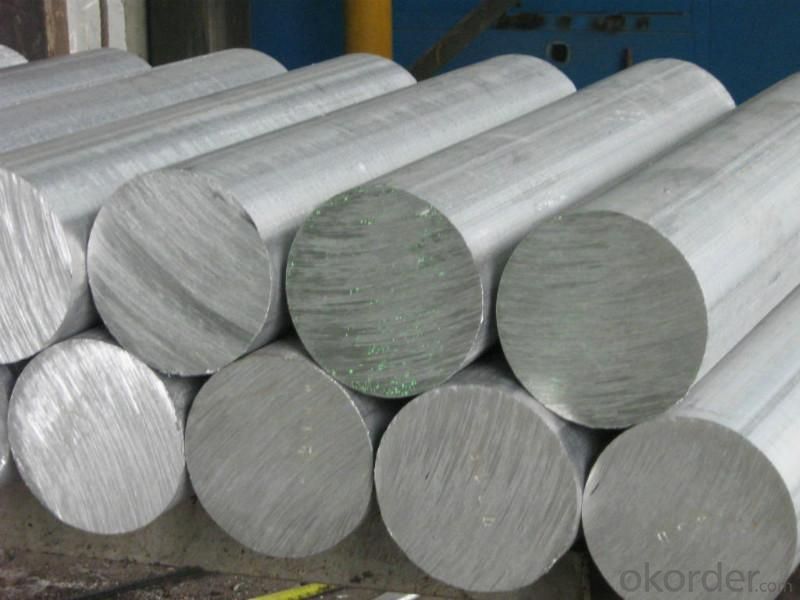
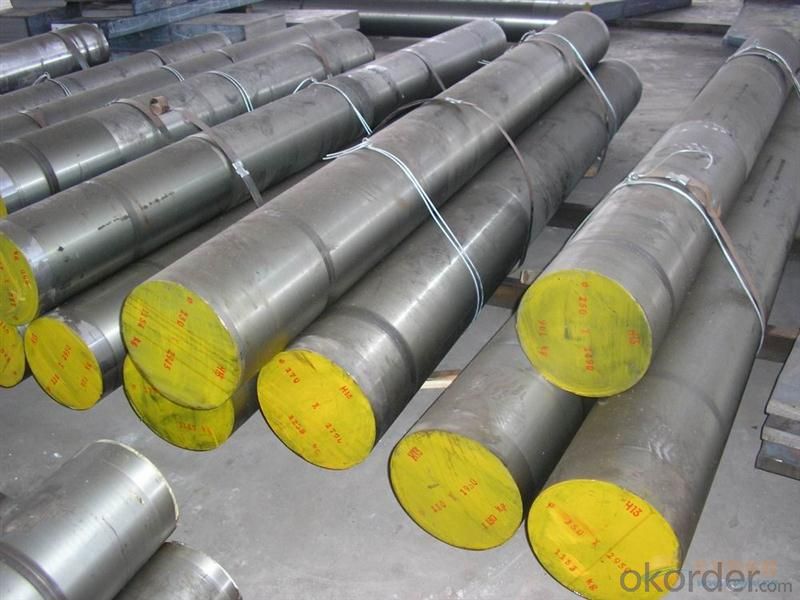
- Q: How does special steel contribute to the energy generation industry?
- Special steel plays a crucial role in the energy generation industry by contributing to the efficiency, reliability, and safety of various components and equipment used in power plants. One key area where special steel is essential is in the construction of turbine blades and generator rotors. These components are subjected to extreme temperatures, pressures, and mechanical stresses. Special steels, such as superalloys, are specifically designed to withstand these harsh conditions, ensuring the longevity and performance of these critical parts. By using special steel, power plants can operate at higher temperatures and pressures, leading to increased energy efficiency and power output. In addition to turbine components, special steel is also used in the construction of boilers and heat exchangers. These components are exposed to high temperatures and corrosive environments. Special steel alloys, such as stainless steels, are highly resistant to corrosion and can withstand the harsh conditions encountered in power plant operations. This corrosion resistance ensures the longevity and reliability of these components, reducing maintenance costs and downtime. Furthermore, special steel is utilized in the construction of transmission and distribution infrastructure. Steel cables and conductors are used to transmit electricity over long distances, and special steel alloys provide the necessary strength and conductivity for efficient power transmission. Additionally, steel is used in the construction of towers, poles, and other support structures, ensuring the stability and reliability of the electrical grid. Moreover, special steel is also vital in the production of nuclear energy. Nuclear power plants require materials that can withstand extreme temperatures, high radiation levels, and corrosive environments. Special steel alloys, such as stainless steels and nickel-based alloys, are specifically designed to meet these requirements, providing the necessary strength, resistance to radiation, and corrosion resistance for the safe and efficient operation of nuclear reactors. In summary, special steel is an integral part of the energy generation industry. Its unique properties and capabilities contribute to the efficiency, reliability, and safety of various components and equipment used in power plants. By using special steel, power plants can increase energy efficiency, reduce maintenance costs, and ensure the longevity and performance of critical infrastructure, ultimately supporting the sustainable and reliable generation of electricity.
- Q: How is ultra-high-strength alloy steel used in the aerospace industry?
- Ultra-high-strength alloy steel is used extensively in the aerospace industry due to its exceptional strength-to-weight ratio and excellent resistance to corrosion and fatigue. It is primarily employed in the manufacturing of critical components such as aircraft frames, landing gear, engine parts, and fasteners. This steel's remarkable strength ensures the structural integrity and safety of aerospace vehicles while reducing their overall weight, thereby improving fuel efficiency and flight performance.
- Q: What are the properties of high-strength tool steel?
- High-strength tool steel typically possesses excellent hardness, toughness, wear resistance, and ability to retain its shape even under high temperatures and pressures. It is known for its durability, ability to withstand heavy loads, and resistance to deformation, making it ideal for demanding applications in tooling and machining.
- Q: How does special steel contribute to the energy equipment industry?
- The energy equipment industry heavily relies on special steel due to its crucial role in providing strength, durability, and resistance to extreme conditions. This industry encompasses various sectors, including oil and gas, renewable energy, power generation, and transmission. In the oil and gas sector, special steel is indispensable for constructing pipelines, drilling equipment, and storage tanks. Its unique properties, such as high tensile strength, corrosion resistance, and ability to withstand high pressure and temperature, make it an ideal material for these applications. Special steel ensures the safety and reliability of oil and gas operations by enduring harsh environments like corrosive substances and extreme weather conditions. The renewable energy sector also relies on special steel for manufacturing wind turbines, solar panels, and hydroelectric power systems. These energy sources require materials that are both strong and lightweight to withstand constant exposure to nature's elements. Special steel alloys, like high-strength low-alloy (HSLA) steel and stainless steel, are commonly used to construct the infrastructure of renewable energy systems, ensuring their longevity and efficiency. Moreover, special steel is essential for power generation and transmission equipment. It is utilized in the manufacturing of gas turbines, steam turbines, and generators. Special steel alloys can withstand the high temperatures and pressures generated during power generation processes, ensuring efficient and reliable energy production. Additionally, special steel is used in transmission infrastructure, including transmission towers and power cables, to support the efficient and safe transfer of electricity over long distances. Overall, special steel significantly contributes to the energy equipment industry by providing the necessary strength, durability, and resistance to extreme conditions. It enables the construction of reliable and efficient infrastructure, ensuring the smooth operation of energy systems in oil and gas, renewable energy, power generation, and transmission sectors.
- Q: How is special steel used in the production of surgical instruments?
- Special steel is used in the production of surgical instruments due to its unique properties such as corrosion resistance, high strength, and durability. This type of steel is specifically designed to withstand the harsh conditions of surgical procedures, ensuring the instruments remain sharp, sterile, and reliable. The use of special steel in surgical instruments guarantees precision and quality, ultimately enhancing the safety and effectiveness of medical procedures.
- Q: What are some examples of special steel alloys?
- Various industries widely use special steel alloys, and stainless steel serves as one prominent example. It boasts a minimum chromium content of 10.5%, rendering it highly resistant to corrosion. Stainless steel finds common applications in the manufacturing of kitchen utensils, medical equipment, and automotive parts. Another prime instance is tool steel, which possesses exceptional hardness and wear resistance. This type of steel often finds use in the production of cutting tools, molds, and dies. High-speed steel stands as yet another distinct special steel alloy renowned for its ability to maintain hardness under elevated temperatures. This quality makes it ideal for manufacturing cutting tools employed in high-speed machining operations. Alloy steel falls into a broad category that encompasses various steel alloys, each exhibiting specific properties. For instance, low alloy steel incorporates small quantities of other elements like manganese, nickel, or silicon to enhance its strength and toughness. The construction industry frequently employs this steel type. Additionally, maraging steel represents a unique alloy combining high strength with excellent toughness. Aerospace applications, including aircraft landing gear and missile components, often rely on its capacity to withstand high stress and impact. In conclusion, the aforementioned examples merely scratch the surface of the extensive range of special steel alloys available. Each alloy caters to specific requirements and applications, spanning industries from construction to aerospace.
- Q: What is the cost of special steel compared to other materials?
- The cost of special steel can vary depending on various factors such as the type of steel, its composition, and market conditions. Generally, special steel tends to be more expensive than common materials like carbon steel or aluminum due to its unique properties and specialized manufacturing processes. However, it is important to consider that the cost of materials is just one aspect of the overall cost of a project, as factors like durability, performance, and maintenance requirements also play a significant role in the decision-making process.
- Q: How does special steel perform in high-temperature creep resistance?
- Special steel has excellent performance in high-temperature creep resistance. It is specifically designed to withstand prolonged exposure to elevated temperatures without undergoing excessive deformation. This is achieved through the addition of alloying elements and a careful heat treatment process, which help to enhance the steel's strength, stability, and resistance to creep. Special steel's superior creep resistance makes it a reliable choice for applications that involve high temperatures and long-term stress, ensuring the structural integrity and durability of the material.
- Q: How is special steel used in the production of turbine shafts?
- Special steel is used in the production of turbine shafts due to its high strength, durability, and resistance to corrosion and fatigue. The unique properties of special steel make it ideal for withstanding the extreme conditions and loads experienced by turbine shafts during operation, ensuring efficient and reliable power generation.
- Q: What are the casting methods for special steel?
- There are several casting methods used for special steel, including the traditional sand casting method, investment casting, and continuous casting. Each method has its own advantages and is chosen based on factors such as the complexity of the steel shape, desired surface finish, and production volume.
Send your message to us
SAE 4340 Alloy Steel Round Bar SCM430 Steel Bar
- Loading Port:
- Tianjin
- Payment Terms:
- TT OR LC
- Min Order Qty:
- 25 m.t.
- Supply Capability:
- 50000 m.t./month
OKorder Service Pledge
OKorder Financial Service
Similar products
Hot products
Hot Searches
Related keywords
